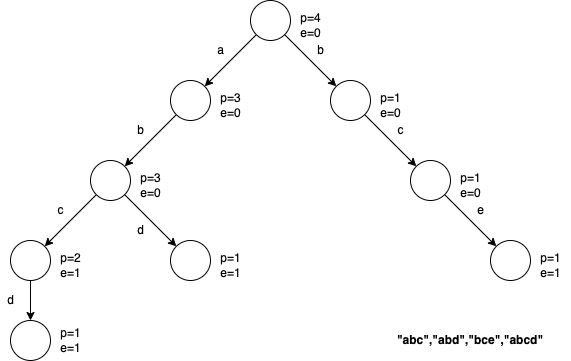前缀树也称为字典树、Trie树,优点在于利用字符串的公共前缀来减少查询时间,常被搜索引擎用于文本词频统计。
前缀树构建过程
以字符串“abc”,“abd”,“bce”,“abcd”为例,前缀树构建过程如下图所示:
- 每个节点记录经过当前节点的字符串数量p和是否是字符串结尾e
- 每条线段表示字符

前缀树实现
1
2
3
4
5
6
7
8
9
10
11
12
13
14
15
16
17
18
19
20
21
22
23
24
25
26
27
28
29
30
31
32
33
34
35
36
37
38
39
40
41
42
43
44
45
46
47
48
49
50
51
52
53
54
55
56
57
58
59
60
61
62
63
64
65
66
67
68
69
70
71
72
73
74
75
76
77
78
79
80
81
82
83
84
85
86
87
88
89
90
91
92
93
94
95
96
97
| public static class Node {
public int pass;
public int end;
public Node[] nexts;
public Node() {
pass = 0;
end = 0;
nexts = new Node[26];
}
}
public static class Trie {
public Node root;
public Trie() {
root = new Node();
}
public void insert(String word) {
if (word == null) {
return;
}
char[] chs = word.toCharArray();
Node node = root;
node.pass++;
int path = 0;
for (int i = 0; i < chs.length; i++) {
path = chs[i] - 'a';
if (node.nexts[path] == null) {
node.nexts[path] = new Node();
}
node = node.nexts[path];
node.pass++;
}
node.end++;
}
public void delete(String word) {
if (search(word) != 0) {
char[] chs = word.toCharArray();
Node node = root;
node.pass--;
int path = 0;
for (int i = 0; i < chs.length; i++) {
path = chs[i] - 'a';
if (--node.nexts[path].pass == 0) {
node.nexts[path] = null;
return;
}
node = node.nexts[path];
}
node.end--;
}
}
public int search(String word) {
if (word == null) {
return 0;
}
char[] chs = word.toCharArray();
Node node = root;
int index = 0;
for (int i = 0; i < chs.length; i++) {
index = chs[i] - 'a';
if (node.nexts[index] == null) {
return 0;
}
node = node.nexts[index];
}
return node.end;
}
public int prefixNumber(String pre) {
if (pre == null) {
return 0;
}
char[] chs = pre.toCharArray();
Node node = root;
int index = 0;
for (int i = 0; i < chs.length; i++) {
index = chs[i] - 'a';
if (node.nexts[index] == null) {
return 0;
}
node = node.nexts[index];
}
return node.pass;
}
}
|

